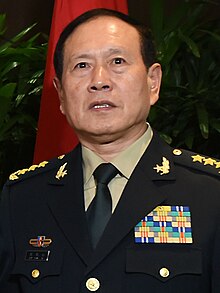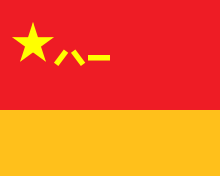Wei Fenghe
Wei Fenghe ( Chinese 魏 鳳 和 / 魏 凤 和 , Pinyin Wèi Fènghé ; born February 1954 in Wenchen, Shandong ) is a Chinese general and politician of the Chinese Communist Party . He has been Minister of Defense of the People's Republic of China since March 19, 2018 .
Life
Born in February 1954 to a simple farmer in Wenchen Township (温 陈), Chiping County , Shandong Province, Wei Fenghe joined the People's Liberation Army in December 1970 during the Cultural Revolution at the age of 16 . He began his service in Luoyang , Henan Province , on "Base 54" (第 54 基地, Pinyin Dì 54 Jīdì ) of Brigade 813 of the 2nd Artillery Corps, which had been responsible for China's strategic nuclear weapons since July 1, 1966 . In January 1972, when he was not yet 18 years old, he also joined the Chinese Communist Party.
Defense Minister Lin Biao had abolished the ranks of the People's Liberation Army in 1965 . Hence, Wei Fenghe was just a soldier. Nevertheless, there were opportunities for advancement through the position . Wei brought it soon became the group leader (班长, Pinyin bānzhǎng ), representing a non-commissioned officer corresponded, in 1974 then to the train driver (排长, Pinyin páizhǎng ), so Lieutenant .
From 1975 to 1977 he trained at the ICBM (大 型号 导弹 中专, Pinyin Dàxínghào Dǎodàn Zhōngzhuān ) based on base 20 about 200 km northeast of Jiuquan for the engine and control systems of the Dongfeng 5, which is still in the test phase (东风 -5 型 洲际 弹道导弹, short 东 五 导弹, Pinyin Dōng Wǔ Dǎodàn ). These technical schools correspond roughly to the German technical college and offer a qualification comparable to the technical diploma, which entitles them to study at a technical college (大专, Pinyin dàzhuān ). In 1982 Wei began studying at the staff service faculty (指挥 系, Pinyin Zhǐhuī Xì ) of the Academy of the 2nd Artillery Corps (中国人民解放军 第二 炮兵 学院, Pinyin Zhōnggúo Rénmín Jiěfàngjūn Dì Èr Pàobīng Xuéyuàn ) in Wuhan , where he was in 1984 graduated. He then acted as a staff officer, sub-department head and department head with the staff of 813 Brigade, and finally as deputy brigade commander . In 1994, at the age of 40, he was awarded the rank of Grand Colonel (大校, Pinyin dàxiào ), who is located in China between colonel and brigadier general (Defense Minister Qin Jiwei had reintroduced the ranks in 1988). At the same time he was appointed commander of his brigade.
In 1986 the Academy of the 2nd Artillery Corps was upgraded to the Command Academy (指挥 学院, Pinyin Zhǐhuī Xuéyuàn ), and in 1990 it was given the right to award master ’s degrees. Wei Fenghe began a distance learning course in telecommunications staff service there in 1994 (通信 指挥, Pinyin Tōngxìn Zhǐhuī , i.e. wired and wireless transmission of commands and control signals), which he successfully completed in 1997. From 1999 to 2001, he served as Deputy Chief of Staff on Base 54, then as Chief of Staff. In 2003, Wei was transferred to Yunnan and became the commander of Base 53 in Jianshui . In 2005 Wei Fenghe became the deputy chief of staff of the 2nd Artillery Corps, and in 2006 the regular chief of staff. In December 2012, he was transferred to the General Staff of the People's Liberation Army as Deputy Chief of Staff. In October 2012 Wei took over from General Jing Zhiyuan (靖 志远, * October 1944) command of the 2nd Artillery Corps, the strategic missile forces of China. At the same time, he became a member of the Central Military Commission , both the state and the CCP (both commissions are identical in personnel).
As part of the military reform that came into force on January 1, 2016, the 2nd Artillery Corps was spun off from the army and became the fourth branch of the Chinese army as the "rocket forces of the Chinese People's Liberation Army" (中国人民解放军 火箭 军, Pinyin Zhōnggúo Rénmín Jiěfàngjūn Huǒjiànjūn ) . Wei Fenghe remained in command; Xi Jinping , President of the Republic and Chairman of the Central Military Commission, presented General Wei with the flag of the new armed forces in a grand ceremony held on the afternoon of December 31, 2015 in the VBA building in Beijing . Before the 19th Congress of the CCP (October 18–24, 2017), the commanders of the four major branches of the armed forces were changed; In September 2017, Wei Fenghe handed over the command of the missile force to his previous deputy, Lieutenant General Zhou Yaning (周亚宁, * December 1957). However, General Wei retained his post as a member of the Central Military Commissions of State and Party and has held them to this day (November 2018).
Wei Fenghe was selected as one of 167 candidates for the Central Committee of the Chinese Communist Party at the 17th CCP Congress (October 15-21, 2007) . At the 18th party congress (November 8-14, 2012) he became one of 205 full members of the Central Committee, and at the 19th party congress in 2017 he was confirmed in this position. At the session of the 13th National People's Congress on March 19, 2018, Prime Minister Li Keqiang proposed that Wei Fenghe be appointed Minister of Defense and State Commissioner at the same time. The latter is a position that was introduced with Article 86 of the 1982 constitution and is located below the (currently 4) Vice Chancellors but above the Ministers. According to Article 88 of the Constitution, the (currently 5) State Commissioners support the Prime Minister in his work. The People's Congress accepted Li Keqiang's proposal, and President Xi Jinping signed the certificate of appointment that same day.
In China, the highest level of command comes from the Central Military Commission. Thus, Wei Fenghe's post as Minister of Defense is largely ceremonial; its primary task is to maintain relations with foreign armed forces. For example, on July 19, 2018, he received Philippe Rebord , the head of the Swiss Army , and discussed the exchange of officers, cooperation in international peacekeeping missions and questions relating to the strategic partnership between the two countries. Since Wei Fenghe is a member of the Central Military Commission and forms a kind of "core cabinet" with his fellow State Commissioners Wang Yi (Foreign Minister) and Zhao Kezhi (Minister for Public Security), his personal influence is quite considerable.
Web links
- Official activities Wei Fenghes as defense minister (English)
- Official activities Wei Fenghes as state commissioner (English)
- Official website of the Command Academy of the 2nd Artillery Corps (2007); today "Leadership Academy of the Missile Forces" (Chinese)
Individual evidence
- ↑ 魏 凤 和 简历. In: http://www.gov.cn . March 19, 2018, Retrieved November 28, 2018 (Chinese).
- ↑ 两 虎将 挂帅 空军 和 二炮. In: http://www.people.com.cn . Retrieved November 25, 2018 (Chinese).
- ↑ 1966 年 10 月 , 聂荣臻 到 二十 基地 主持 核导弹 发射 试验. In: http://cpc.people.com.cn . Retrieved November 28, 2018 (Chinese).
- ↑ 两 虎将 挂帅 空军 和 二炮. In: http://www.people.com.cn . Retrieved November 25, 2018 (Chinese).
- ↑ 魏 凤 和 简历. In: http://www.gov.cn . March 19, 2018, Retrieved November 28, 2018 (Chinese).
- ^ At that time the academy still had the status of a technical college.
- ↑ 第二 炮兵 指挥 学院. In: http://www.mod.gov.cn . July 9, 2007, Retrieved November 26, 2018 (Chinese).
- ↑ 张宏洲: 2017 军校 巡礼 第二 十五 站 : 航天 工程 大学. In: http://www.mod.gov.cn . June 15, 2017, Retrieved March 6, 2019 (Chinese).
- ↑ 岳 怀 让: 魏 凤 和 任 解放军 火箭 军 司令员 王家胜 任 政委. In: http://news.sina.com.cn . January 1, 2016, accessed November 27, 2018 (Chinese).
- ↑ 岳 怀 让: 魏 凤 和 任 解放军 火箭 军 司令员 王家胜 任 政委. In: http://news.sina.com.cn . January 1, 2016, accessed November 27, 2018 (Chinese).
- ↑ General Gao Jin (高 津, * April 1959), commander of the electronic warfare (中国人民解放军 战略 支援部队, Pinyin Zhōnggúo Rénmín Jiěfàngjūn Zhànlüè Zhīyuán Bùduì ), which was also outsourced as a separate armed force on December 31, 2015 , but retained his post.
- ↑ 单 学 刚: 四大 军种 集中 迎来 新任 司令员 , 都 有啥 特点? In: http://news.ifeng.com . September 16, 2017, Retrieved November 28, 2018 (Chinese).
- ↑ 魏 凤 和 简历. In: http://www.gov.cn . March 19, 2018, Retrieved November 28, 2018 (Chinese).
- ↑ 中共中央 军事 委员会 、 中华人民共和国 中央 军事 委员会. In: http://www.mod.gov.cn . Retrieved November 28, 2018 (Chinese).
- ↑ 中国 共产党 第十七 届 中央 委员会 候补委员 名单. In: http://cpc.people.com.cn . October 21, 2007, Retrieved November 28, 2018 (Chinese).
- ↑ 中国 共产党 第十 八届 中央 委员会 委员 名单. In: http://cpc.people.com.cn . Retrieved November 28, 2018 (Chinese).
- ↑ 中国 共产党 第十 九届 中央 委员会 委员 名单. In: http://cpc.people.com.cn . October 24, 2017, Retrieved November 28, 2018 (Chinese).
- ↑ Constitution of the People's Republic of China. In: http://www.verfassungen.net . December 4, 1982. Retrieved November 29, 2018 .
- ↑ 侯磊: 魏 凤 和 被 任命 为 国务 委员 、 国防部 部长. In: http://www.81.cn . March 19, 2018, Retrieved November 29, 2018 (Chinese).
- ^ Ex-missile force commander Wei Fenghe named defense minister. In: http://www.thestandard.com.hk . March 19, 2018, accessed November 29, 2018 .
- ↑ Li Jiayao: China, Switzerland to strengthen military cooperation. In: http://eng.mod.gov.cn . July 19, 2018, accessed November 29, 2018 . The German Defense Minister Ursula von der Leyen , on the other hand, was received on October 22, 2018 by General Xu Qiliang , one of the two vice chairmen of the ZMK. Zhang Zhihao: Sino-German military ties, joint work to be bolstered. In: http://english.gov.cn . October 23, 2018, accessed November 29, 2018 .
- ↑ 冯文雅: 快讯 : 根据 宪法 , 国务院 总理 李克强 提名魏 凤 和 、 王勇 、 王毅 、 肖 捷 、 赵克 志 为 国务 委员 人选. In: http://www.xinhuanet.com . March 19, 2018, Retrieved November 29, 2018 (Chinese).
| personal data | |
|---|---|
| SURNAME | Wei, Fenghe |
| ALTERNATIVE NAMES | 魏 凤 和 (Chinese); Wèi Fènghé (Pinyin) |
| BRIEF DESCRIPTION | Chinese General of the People's Liberation Army and politician |
| DATE OF BIRTH | February 1954 |
| PLACE OF BIRTH | Wenchen, Shandong Province |

